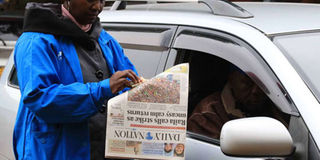Why Nairobi news is always prime, cleaner

A newspaper vendor sells a copy of the Daily Nation in Nyeri Town on August 14, 2017. Many readers do not know that newspapers usually have more than one edition every day. PHOTO | FILE | NATION MEDIA GROUP
What you need to know:
- The city edition had dropped many earlier news items from an earlier edition because the earlier edition had had to go to press as early as possible.
- The Latin phrase quid pro quo refers to the something you have to pay in order to receive the latest and very best edition of it.
Though I frequently meet the word issuance in Kenya’s English language newspapers, I never meet it in my books.
From all newspaper contexts where I have seen issuance, it is as a noun that it is meant.
However, I want to emphasise that, as an English word, issuance is not in my vocabulary in any part of speech.
But I don’t know such a noun. Though issue is a verb, the noun formed it is also imply issue. The Nation publishes at least three daily issues.
The earliest is styled “Coast”, the next “Upcountry” (the rest of Kenya, except Nairobi, which thus receives the latest and best edited items).
However, even such an issue has a quid pro quo, something for which you must pay heavily to enjoy the privilege of receiving the best of it, namely, the one most cared for editorially.
Equally, however, the capital city does not receive some of the earliest news items.
CITY EDITION
The Latin phrase quid pro quo refers to the something you have to pay in order to receive the latest and very best edition of it.
Equally, however, Nairobi pays by receiving only an edition not carrying many of the day’s earliest events.
The city edition had dropped many earlier news items from an earlier edition because the earlier edition had had to go to press as early as possible.
Especially in technological backwardness, to go to press is to take the edited material for printing, an event which, under technological backwardness, is fraught with dangers.
One is that you must go to press as early as possible. To go to press is to transfer the edited material to the printer.
Where the editorial and the printing companies have different owners, with conflicting business styles and attitudes, it may be costly even when both companies belong to the same individual.
READERS
That is a dire fact in all Third World countries in which technological conditions remain so backward.
That is why readers find so many annoying mistakes, including typos and language — in the pages of all of Kenya’s newspapers.
For instance, there are days when a number of the latest stories are bound by the technological circumstances to be destined to appear only in the latest (the city) edition.
Many readers do not know that newspapers usually have more than one edition every day.
When I was one of its central editors, the Nation usually had three daily editions, styled “Coast”, “Upcountry” and “City”.
The city edition carried the latest news items. The situation may have changed since I retired a decade ago.
Philip Ochieng is a retired journalist. [email protected]





